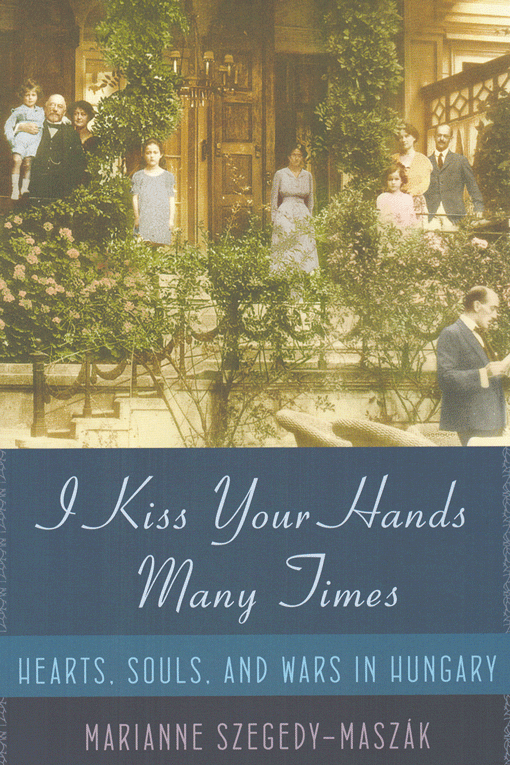Reviewed by NEAL GENDLER
It’s little wonder that by midlife, Aladár Szegedy-Maszák, the author’s handsome father with the brilliant diplomatic career and elegant wife, had slipped into a depression from which he would never fully recover.
By June 1947, Aladár, Hungary’s popular first postwar ambassador to the United States, had nearly died in Dachau, lost his country twice — first to Hitler, then to Stalin — then his first child to a physician’s misdiagnosis, and then his head-of-household status after wife Hanna’s once rich, powerful in-laws came to America and moved in.
“We were not a conventional nuclear family but a sprawling, diffuse, middle-European, three- generation household dominated by the Kornfelds, my mother’s people, converted aristocratic Jews,” Marianne Szegedy-Maszák writes. The dinner table reflected the power, with “my baroness grandmother, Marianne, presiding.”
 Christian-born Aladár had been well accepted by the family of Hanna Kornfeld, a tall, slender young woman, multilingual and adept at riding, sports, dance and shooting. During the war, marriage was impossible, but his letters, found after Hanna’s death, revealed the romance invisible to her children and led to this book.
Christian-born Aladár had been well accepted by the family of Hanna Kornfeld, a tall, slender young woman, multilingual and adept at riding, sports, dance and shooting. During the war, marriage was impossible, but his letters, found after Hanna’s death, revealed the romance invisible to her children and led to this book.
The title comes from Aladár’s alteration in letters to Hanna of a traditional Hungarian closing of any letter to a lady, “I Kiss Your Hands.”
I Kiss Your Hands Many Times deftly interweaves multiple stories: the lives of one of Hungary’s richest, most influential Jewish families before World War II; Aladár’s efforts to prevent Hungary allying with Germany, then later to negotiate a separate peace with the Western allies; the family’s subterfuge to retain its industrial empire, then trading it for freedom, and the love story of the author’s formerly distinguished parents.
The force and depth of that love is the core around which the other stories unfold, economically and engrossingly told by experienced journalist Marianne Szegedy-Maszák, the couple’s daughter. A family tree reduced my confusion over relationships, and I liked the photos, which aren’t identified until the end. But the book cries for an index.
We don’t learn much about Hungarian Jews’ daily struggles; the descendants of Manfred Weiss, whose metal works once employed 40,000, inhabited their own world. On Jan. 8, 1943, Hanna called it “amazing” that such a “carefree, peaceful life still exists.” For them; by then, “Hungary had done nothing to eliminate the Jews — it only inconvenienced and humiliated them,” the author says. But more than 100,000 Jewish men were drafted as laborers on the Russian front, where tens of thousands died.
The jacket photo fits the author’s description of one not shown: the family in “the innocent perfection of that frozen moment… after which they were all one millimeter closer to the utter oblivion of all that was contained” in it. Then, “they were great and important people,” barons and baronesses with noblesse oblige, living “lives of splendor and privilege.”
In the author’s postwar Washington, D.C., home, with five adults and three children, “what mattered is what preceded us. The life before America. The life before the war. Yes, even life during the war,” before Germany’s invasion on March 19, 1944, and Adolf Eichmann sent more than half of Hungary’s Jews to Auschwitz. “The daily grind in America paled in comparison to the eradicated Hungarian world; the past trumped the present.”
Weiss had built Hungary’s preeminent industry and his family had lived “big and visible lives,” with multiple residences and close relationships with national leaders. Although baptized, they still were considered Jews, “albeit, like many other Jews in Budapest, Christian ones.” When forbidden to own the companies because they were “racially” Jewish, they kept control by selling majority shares to the family’s born Christians. Germans saw through that, but their rivalries and greed were manipulated to trade the businesses for passage of three dozen family members to Switzerland and Portugal. Many later came to America.
Hanna had understood the magnitude of the change the day the Germans invaded, writing in her journal, “minden prius,” which the author characterizes as “everything that once was, is over.”
***
Neal Gendler is a Minneapolis writer and editor.
(American Jewish World, 10.11.13)



















